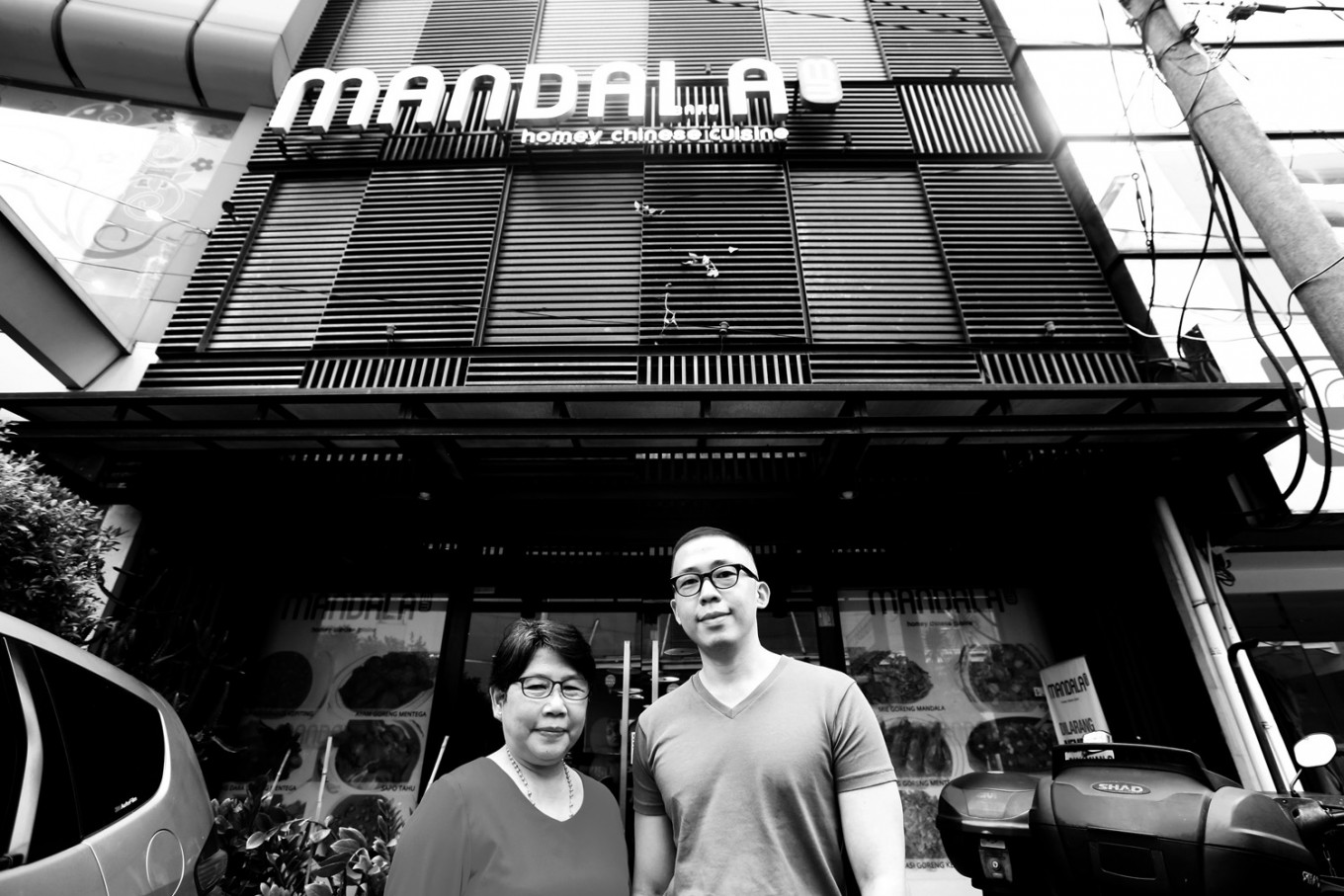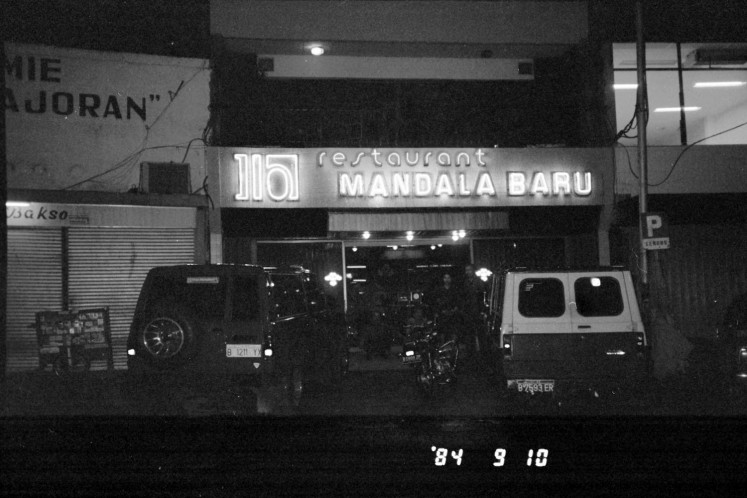Popular Reads
Top Results
Can't find what you're looking for?
View all search resultsPopular Reads
Top Results
Can't find what you're looking for?
View all search resultsSons of Mandala Baru’s founders maintain nostalgic flavors
Established since 1962, Mandala Baru restaurant in Mayestik still maintains its traditions.
Change text size
Gift Premium Articles
to Anyone
D
rizzle in the Mayestik area has no effect on the hustle and bustle there. Considered South Jakarta’s textile haven, Mayestik is also home to Mandala Baru, a Chinese restaurant that was established in 1962.
Located in two shop-houses nestled between a textile shop and a bank, Mandala Baru oozes simplicity with its modern-minimalist interior, emphasized by its off-white walls, sofas, hanging lamps and several photos of the restaurant’s old days. The faint sound of Chinese instrumental music adds to the atmosphere, as well as the slight aroma of food being prepared in the kitchen, which is located behind the cashier's booth.
Penawati, the owner of the restaurant who is in her 60s, moves briskly between the dining area and the kitchen. Wearing a bright red blouse and black-framed glasses, she tells the story of Mandala Baru’s humble beginnings to The Jakarta Post. She started out as a street food vendor with her husband on Jl. Sabang, Central Jakarta, in the 1960s. They served various versions of bakmi (noodles) back then.
“My husband cooks somewhat playfully and doesn’t make much noise [while cooking],” Penawati said of her husband. “But the aroma is always delightful. That’s his talent. Our sons were also amazed [by his skills],” she said.
Restoran Mandala Baru di kawasan Pasar Mayestik, Jakarta Selatan, 10 September 1984. (Courtesy of /Mandala Baru)The street vendor couple had to move to make way for the Games of the New Emerging Forces (GANEFO), held in 1963 during the days of the Sukarno regime, which forced them to look for a place in the area where Mayestik now stands. Back then, the area was not named Mayestik and according to Penawati, it was not a really safe place.
Their business slowly but surely grew, enabling them to rent premises and name the restaurant Mandala at the suggestion of a customer. The name was inspired by the Trikora military operation. Penawati and her husband then bought premised not far from the rented place and named it Mandala Baru.
People often mistake Mandala Baru with a restaurant that has a similar name in Petogogan, South Jakarta. Both are actually related but have different menus. Some people believe that Mandala Baru is newer than the restaurant in Petogogan as they presume the word baru (new) indicates that, but it is actually the opposite. “We should’ve used ‘Mandala Dua’ [instead of Mandala Baru],” said Penawati with a small laugh.
Read also: Jakpost guide to Pasar Mayestik
Having run the restaurant for more than 50 years, Penawati has not pushed her sons to follow in her footsteps. “I don’t want my sons to [continue the business] because I make them. They have to be passionate and enthusiastic in doing it,” she said while looking at Dany David, 39, one of her sons who was sitting beside her. “I told them, whether they want to continue the business or not is entirely up to them. The restaurant is the fruit of their father’s struggle. They can continue it if they want to. Dedy stepped up, and Dany followed suit,” she said with pride.
Her sons, Dedy Chandra, 44, and Dany, have been helping their parents since they were young. Dany recalled the time when he was taught to operate a cash register when he was little. “[The education] is similar to any typical Chinese family. We just know we have to help,” Dany said.
Both have worked at different places, but eventually found their way back to the restaurant. Dedy likes to cook, while Dany manages other aspects of the restaurant, such as interior, logo, menu design and Instagram account.
Dany was adamant about continuing the family business and has decided against getting caught up in the startup trend. “Honestly, I’ve tried working for [other] companies, but in the end I know my core is this business,” he said. “Many people end up launching a business or a startup, while I already have [a business]. It’s a family business, so why not pursue it more seriously?” he said.
Both Penawati and Dany agree that they want to preserve family tradition, particularly in the restaurant’s food. Regular patrons know Mandala Baru for its signature dishes, such as mie goreng (fried noodles), ayam goreng mentega (fried chicken in butter sauce), gurame asam manis (sweet and sour carp), bistik sapi (beef with sauce and french fries) and sapo tahu (tofu cooked in a clay pot).
“Our food hasn’t changed in a long time. People tell me to innovate, but what I see from the other side is that our customers come for the same flavors. If we change the menu too much, the taste would be foreign to our customers,” Dany said.
The challenge was solved when Dany breathed new life into the restaurant. “We didn't introduce a new menu but developed several new items. I think it’s more to do with our [food] presentation. As for the rest of the menu, we want to maintain tradition so we've kept it consistent.”
Dany said Jakarta’s robust food scene convinced him to stick to his roots, “It feels right to hold on to our tradition. If we follow trends, there will always be a new restaurant in Jakarta every month, but the hype doesn’t stick. When it’s over, they have to change the concept. We are not selling any concepts, we just sell food."
Dany said the patrons of the restaurant were varied in age group. “Our customers have come here since they were dating, and now they have grandchildren. We also have customers in their 30s who used to come here with their parents,” said Dany.
The restaurant stays open until 10 p.m., when shops in Mayestik are already closed. “It’s our way of appreciating to our old customers,” said Penawati, adding that previously the restaurant stayed open until 2 a.m.
Dany and Dedy take their roles as the guardians of the family business very seriously. Suggestions to open outlets are taken with a grain of salt, as Dany put it, “We still apply a traditional kind of management -- we couldn’t just give it away to some stranger. We may want to do that in the future, but not now. We’ll do it slowly.”
He also takes customers’ suggestions into consideration and uses them as an important basis for any decisions he makes, “I think the quality and the taste of our food are the most important things to be maintained. We can always open an outlet, but we don’t want people saying things like ‘the taste is different'. We definitely don’t want that.”
Her sons' grounded views and willingness to continue the business may be the reason for Penawati’s upbeat persona.
She knows that the family legacy is in good hands. (asw)












